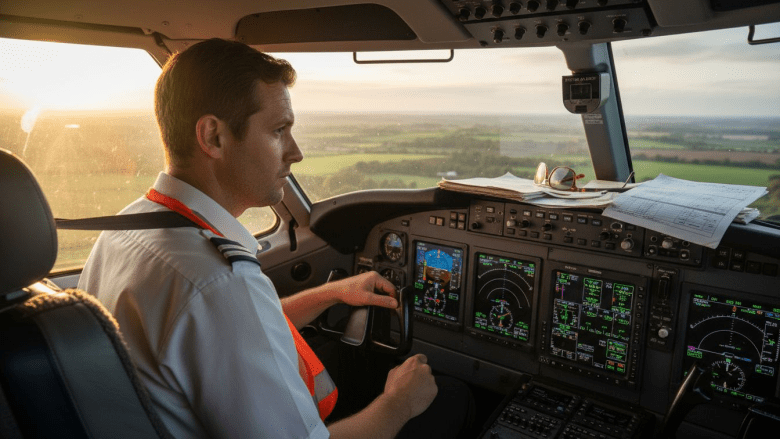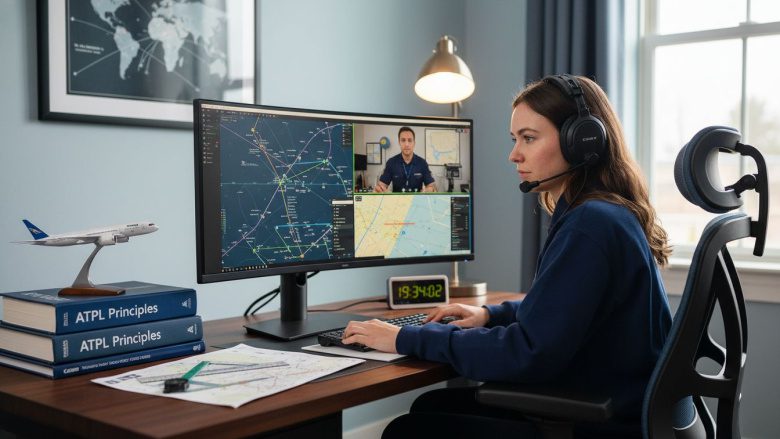Learning to become a professional pilot used to mean giving up flexibility and sticking to rigid classroom timetables. Now, almost 70 percent of new pilot trainees choose online ground school for their aviation theory studies. That might sound like progress, but most people still think online learning makes things easier. In reality, it actually demands a whole new level of discipline if you want to earn your wings.
Table of Contents
- Understand The Basics Of Online Ground School
- Choose The Right Online Ground School Program
- Create A Dedicated Study Environment
- Develop A Structured Study Schedule
- Engage Actively With Interactive Learning Materials
- Utilise Online Resources And Communities
- Prepare For Practical Flight Training
Quick Summary
| Takeaway | Explanation |
|---|---|
| Understand online ground school fundamentals | Learn the key components, such as curriculum, flexibility, and interactive tools essential for aspiring pilots. |
| Select a reputable ground school program | Evaluate options based on EASA approval, course comprehensiveness, and instructor expertise to ensure quality education. |
| Establish a distraction-free study environment | Create a focused workspace with minimal interruptions and essential technology to enhance learning efficiency. |
| Develop a structured study schedule | Implement a systematic approach to time management, prioritising complex topics and regular self-assessments to ensure progress. |
| Engage actively with learning materials | Utilize interactive resources like question banks and simulations to hone practical understanding of theoretical concepts. |
1: Understand the Basics of Online Ground School
Becoming a professional pilot requires comprehensive theoretical knowledge, and online ground school represents a flexible, modern approach to aviation education. At VictorOne, we understand that navigating the complexities of pilot training can seem overwhelming, especially when you’re starting your aviation journey.
Online ground school provides aspiring pilots with a structured pathway to acquire essential theoretical knowledge without the constraints of traditional classroom settings. By leveraging digital platforms, students can access high-quality aviation education from anywhere in the world. According to European Union Aviation Safety Agency, understanding the foundational elements of pilot training is crucial for successful certification.
Key aspects of online ground school that every aspiring pilot should understand include:
-
Comprehensive Curriculum: Covers theoretical subjects like aerodynamics, meteorology, navigation, and aircraft systems
-
Flexible Learning: Self-paced modules allowing students to balance study with personal and professional commitments
-
Interactive Learning Tools: Digital question banks, video lectures, and real-time simulations that enhance understanding
Pilot training through online ground school with VictorOne offers comprehensive EASA-approved theoretical courses designed to prepare students thoroughly for their aviation careers. The digital platform ensures that students receive structured, professional-grade education that meets international aviation standards.
Successful online ground school participation requires commitment, discipline, and a strategic approach to learning. Students must actively engage with course materials, participate in online discussions, and consistently review complex aviation concepts. By embracing these principles, aspiring pilots can transform theoretical knowledge into practical aviation expertise.
2: Choose the Right Online Ground School Program
Selecting the appropriate online ground school program is a critical decision that will significantly impact your aviation career trajectory. Not all pilot training platforms are created equal, and understanding how to evaluate and choose the right program requires careful consideration and strategic thinking.
When investigating potential online ground school options, aspiring pilots should focus on several crucial evaluation criteria. According to International Civil Aviation Organization, comprehensive pilot training demands rigorous and standardized educational approaches.
Key considerations for selecting an online ground school program include:
-
EASA Approval: Ensure the program meets European Aviation Safety Agency certification standards
-
Course Curriculum Comprehensiveness: Verify complete coverage of theoretical knowledge domains
-
Instructor Expertise: Confirm instructors have current commercial aviation experience
-
Digital Learning Resources: Assess quality of interactive materials, question banks, and simulation tools
Pilots must look beyond superficial marketing and dig deeper into the program’s substantive educational offerings. Your guide to completing an EASA-approved ATPL online course provides additional insights into making an informed selection.
Beyond technical specifications, consider the program’s flexibility, support structures, and alignment with your personal learning style. Successful pilot training requires more than passive content consumption – it demands active engagement, consistent practice, and a commitment to understanding complex aviation concepts.
Remember that your chosen online ground school will be your primary knowledge acquisition platform. Invest time in thorough research, request detailed course syllabi, and if possible, speak with current or past students to gain authentic perspectives on the program’s effectiveness and real-world applicability.
3: Create a Dedicated Study Environment
Successful online ground school requires more than just accessing course materials – it demands creating a purposeful and focused study environment that maximizes learning potential. Your physical and digital workspace plays a crucial role in maintaining concentration, managing distractions, and ensuring consistent academic performance.
Research from Stanford University’s Learning Environment Design Lab demonstrates that intentional study environments significantly enhance information retention and cognitive processing. Professional pilots understand that discipline starts with your study setup.
Essential elements of an effective online ground school study environment include:
-
Ergonomic Workspace: Comfortable chair, appropriate desk height, and proper lighting
-
Minimal Digital Distractions: Silent notifications, dedicated study computer or profile
-
Consistent Study Location: Designated area exclusively for aviation learning
-
Reliable Technical Infrastructure: High-speed internet, updated computer, backup devices
Pilots preparing for complex aviation certifications need a space that supports intense theoretical learning. Discover the secrets to successful distance learning can provide additional insights into optimizing your study environment.
Technical preparation is equally important as physical setup. Ensure your computer meets course software requirements, has updated antivirus protection, and can smoothly run interactive learning platforms. Consider investing in noise-cancelling headphones, an external monitor, and a reliable backup system to protect your study materials.
Remember that your study environment reflects your commitment to professional aviation training. A well-organized, distraction-free space signals your dedication to becoming a skilled, knowledgeable pilot. Treat your online ground school study area with the same professionalism you would approach a cockpit – methodical, prepared, and focused on excellence.
4: Develop a Structured Study Schedule
Navigating online ground school successfully requires more than motivation – it demands strategic time management and disciplined scheduling. Professional pilots understand that consistent, structured learning is the cornerstone of aviation knowledge acquisition.
According to Harvard Business Review’s Learning Strategies Research, individuals who develop systematic study routines demonstrate significantly higher knowledge retention and academic performance. For aviation students, this translates directly into better theoretical understanding and exam preparedness.
Key principles for creating an effective pilot training study schedule include:
-
Time Blocking: Allocate specific daily/weekly hours exclusively for aviation studies
-
Prioritization: Focus on complex subjects during peak personal concentration periods
-
Progressive Learning: Break comprehensive modules into manageable daily segments
-
Regular Self-Assessment: Integrate periodic mock tests and knowledge checks
The most successful online ground school participants treat their aviation education like a professional commitment. Best Online Courses for Pilots in 2025 offers additional insights into optimizing learning strategies.
Flexibility does not mean randomness. While online ground school allows self-paced learning, maintaining a consistent schedule prevents procrastination and ensures steady progress. Consider using digital tools like calendar apps, study tracking software, and reminder systems to maintain accountability.
Remember that your study schedule should accommodate your personal circumstances while maintaining rigorous learning standards. Some students might prefer early morning study sessions, while others perform better in evening hours. The key is finding a rhythm that matches your natural productivity cycles and life commitments, ensuring you can consistently engage with complex aviation theoretical content.
5: Engage Actively with Interactive Learning Materials
Successful online ground school requires more than passive content consumption – it demands dynamic and purposeful interaction with learning materials. Interactive resources transform theoretical aviation knowledge from abstract concepts into practical understanding.
Research from MIT’s Digital Learning Laboratory demonstrates that engagement-driven learning approaches significantly improve knowledge retention and skill development. For aviation students, this means going beyond simply reading textbooks and watching lectures.
Strategic approaches to interactive learning include:
-
Question Bank Mastery: Regularly practice with comprehensive digital question sets
-
Simulation Engagement: Utilize digital flight simulators and scenario-based learning tools
-
Peer Discussion Forums: Participate actively in online study groups and discussion platforms
-
Self-Assessment Modules: Complete periodic knowledge checks and progress tracking
Professional pilots understand that interactive learning mimics real-world aviation challenges. Your Guide to Completing an EASA-Approved ATPL Online Course provides additional insights into maximizing digital learning platforms.
Digital learning tools are not just supplementary – they are essential components of modern pilot training. Approach each interactive module as an opportunity to test your understanding, challenge your assumptions, and develop the critical thinking skills necessary for professional aviation.
Remember that genuine learning occurs when you actively engage with content, not merely consume it. Ask questions, challenge presented information, seek additional context, and continuously connect theoretical knowledge with practical aviation scenarios. Your goal is not just to pass exams, but to develop a comprehensive, nuanced understanding of aviation principles that will serve you throughout your flying career.
6: Utilise Online Resources and Communities
Successful online ground school participants understand that learning extends far beyond individual study sessions. Leveraging diverse online resources and professional communities can transform your aviation education experience, providing crucial insights, support, and networking opportunities.
According to International Air Transport Association Research, collaborative learning environments significantly enhance professional skill development and knowledge acquisition for aviation professionals.
Strategic online resource utilisation includes:
-
Professional Aviation Forums: Engage with experienced pilots and learners
-
Webinars and Virtual Workshops: Attend industry-specific online learning events
-
Social Media Professional Networks: Follow aviation experts and training platforms
-
Technical Documentation Resources: Access comprehensive aviation manuals and guides
Digital networking is not merely supplementary – it’s a critical component of modern pilot training. Discover the Secrets to Successful Distance Learning offers additional strategies for maximising online educational communities.
Each online interaction represents an opportunity to gain practical insights, understand industry trends, and build professional connections. Approach these platforms with curiosity, professionalism, and a genuine desire to learn. Ask thoughtful questions, share your experiences, and be open to feedback from seasoned aviation professionals.
Remember that successful pilots are lifelong learners. Online communities provide a dynamic, continuously evolving learning environment that complements your structured online ground school curriculum. By actively participating in these digital spaces, you’re not just acquiring knowledge – you’re building a professional network that could support your aviation career for years to come.
7: Prepare for Practical Flight Training
Transitioning from online ground school to practical flight training represents a critical milestone in your aviation career. The theoretical knowledge acquired through digital platforms must seamlessly translate into real-world flying skills, requiring strategic preparation and a holistic understanding of aviation principles.
According to Royal Air Force Training Guidelines, successful pilots demonstrate a comprehensive approach that bridges theoretical understanding with practical application. This transition demands more than technical knowledge – it requires mental preparation, physical readiness, and a strategic mindset.
Key considerations for preparing for practical flight training include:
-
Physical Fitness: Develop cardiovascular endurance and core strength
-
Mental Preparation: Practice stress management and decision-making techniques
-
Equipment Familiarisation: Study aircraft systems and operational procedures
-
Simulator Training: Utilise flight simulation resources for procedural understanding
Theoretical knowledge is the foundation, but practical application transforms a student into a professional pilot. How to Become an Airline Pilot provides comprehensive insights into this transformative journey.
Successful pilots understand that ground school is not an endpoint, but a launching pad for practical experience. Your online learning should cultivate not just academic knowledge, but a deep understanding of aviation principles, safety protocols, and professional conduct.
Remember that each theoretical concept you learn has a direct, tangible application in the cockpit. Approach your practical training with humility, curiosity, and a commitment to continuous learning. Your ability to translate complex theoretical concepts into smooth, confident flight operations will define your success as a professional pilot.
The table below summarises the seven essential tips for succeeding in online ground school as covered in the article, highlighting key actions and outcomes for aspiring pilots.
| Tip Number & Focus | Key Actions and Guidance | Intended Outcome or Benefit |
|---|---|---|
| 1. Understand Online Ground School | Learn the core curriculum, flexible structure, and digital tools; commit to strategic, active learning. | Comprehensive aviation theory knowledge and exam readiness. |
| 2. Choose the Right Online Programme | Prioritise EASA approval, course scope, instructor expertise, and quality of interactive resources. | High-quality education and professional pilot preparation. |
| 3. Create a Dedicated Study Environment | Set up an ergonomic, distraction-free workspace with reliable technology and consistent study location. | Enhanced concentration, improved retention, and learning focus. |
| 4. Develop a Structured Study Schedule | Establish systematic study routines, time blocking, prioritisation, and regular self-assessment using digital tools. | Consistent progress and better retention of theoretical content. |
| 5. Engage Actively with Interactive Materials | Use question banks, simulations, forums, and regular self-checks to interact meaningfully with course content. | Deeper understanding and practical application of knowledge. |
| 6. Utilise Online Resources and Communities | Participate in forums, webinars, professional networks, and access aviation manuals for collaboration and support. | Broader insights, support, and professional networking. |
| 7. Prepare for Practical Flight Training | Focus on physical fitness, mental readiness, simulation training, and aircraft familiarity to bridge theory and practice. | Smooth transition to practical flying and professional skills. |
Experience Success in Online Ground School with VictorOne
Are you determined to succeed in your online ground school but finding it difficult to stay disciplined and access the right resources? Many aspiring pilots struggle with staying focused, engaging fully with interactive study materials, and choosing accredited programmes that truly prepare them for exam success. That is exactly why our Academy is designed to cover all your needs with flexibility, structure, and continuous support.

Join VictorOne and turn knowledge into career progress. With our EASA-approved pilot theory courses, interactive question banks, and accessible online consultations, you can gain the edge you need in a highly competitive field. Visit VictorOne.eu now and unlock access to a world-class aviation education. Do not let your chance to advance in commercial aviation slip away. Take the next step towards your wings today.
Frequently Asked Questions
What is online ground school?
Online ground school is a flexible, modern approach to aviation education that allows aspiring pilots to acquire essential theoretical knowledge through digital platforms, without the constraints of traditional classroom settings.
How can I choose the right online ground school program?
When selecting an online ground school program, look for EASA approval, comprehensive course curriculum, instructor expertise, and quality digital learning resources. It’s crucial to research and engage with current or past students to get authentic perspectives.
What should my study environment look like for online ground school?
An effective study environment should include an ergonomic workspace, minimal digital distractions, a consistent study location, and reliable technical infrastructure to support focused learning and engagement with the course materials.
How can I prepare for practical flight training after completing online ground school?
To prepare for practical flight training, focus on developing your physical fitness, mental preparedness, familiarity with aircraft systems, and engage in simulator training to bridge the gap between theoretical knowledge and real-world flying skills.
Recommended
- Discover the Secrets to Successful Distance Learning – VictorOne
- Top Study Techniques for Exams: Pilot Success Guide 2025
- Best Online Courses for Pilots in 2025: Complete Guide – VictorOne
- Effective Online Collaboration for Aviation Professionals
- Strategies for Educational Business Success | Go Online Now
- Fluum | What is Online Course Tools for Meal Planning and Gut Health


